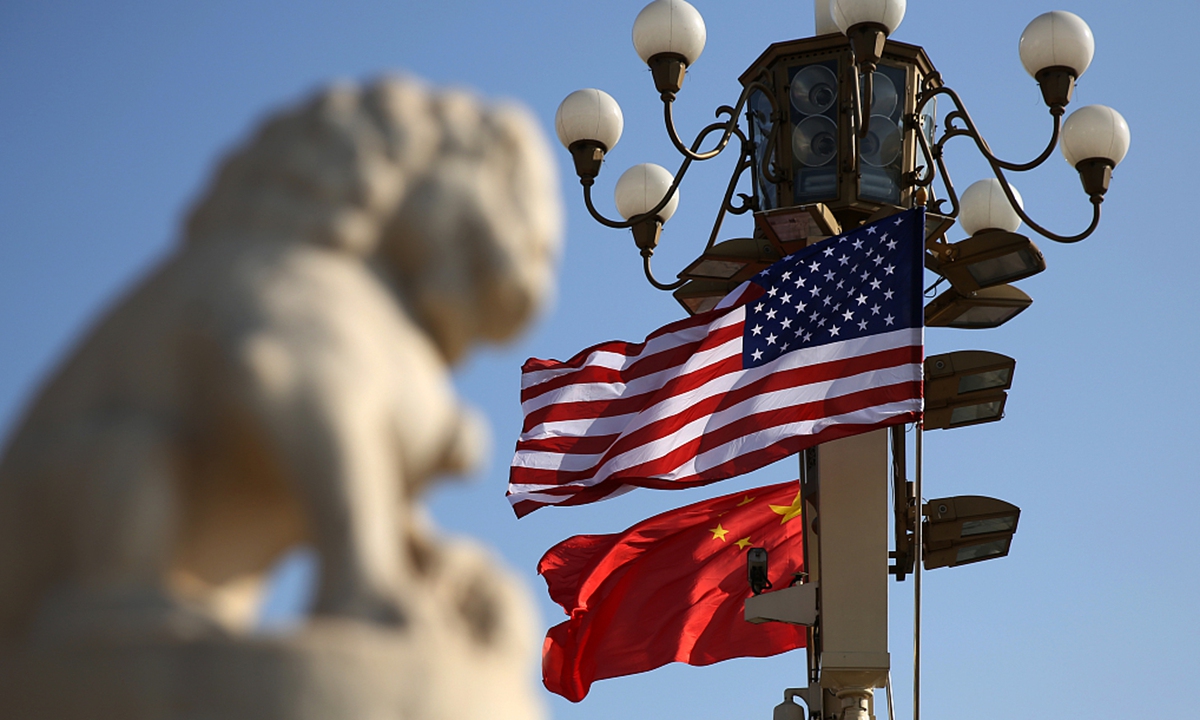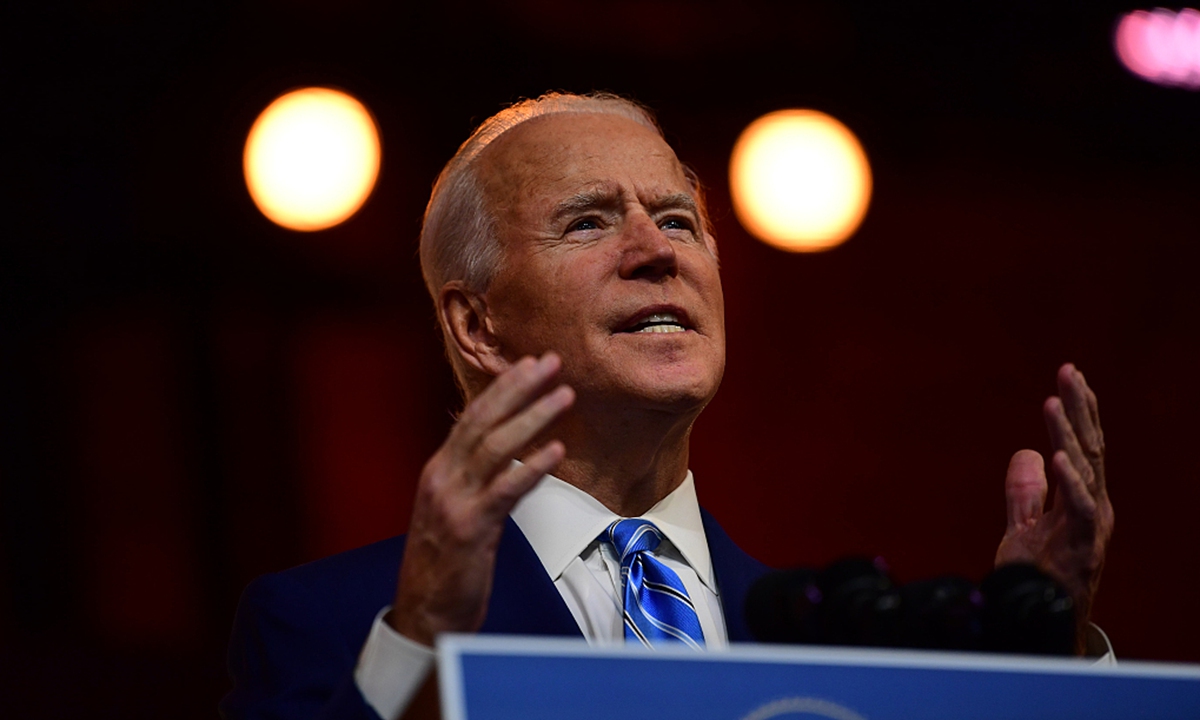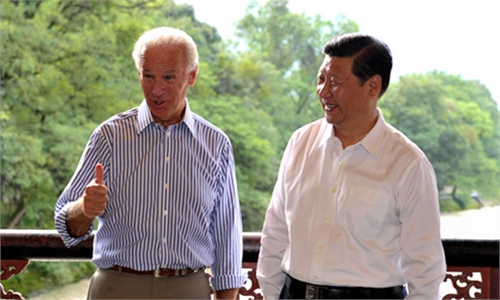
Photo: VCG
After China officially acknowledged Joe Biden's win, the world's attention has turned to the interactions between China and the Biden administration, and where the interactions will lead China-US ties to. Are China and the US falling into the "Thucydides's Trap" during Biden's term, with the worst scenario of outbreak of war, or will the two countries reset their relations?
While some Chinese and international scholars agreed that the competition will still remain the theme of the bilateral relationship, there will be new mode of interactions, which can be defined as either "cooperative competition," "managed competition" or "bounded rivalry."
Biden's campaign team said that they appreciated the congratulations of President Xi Jinping, after Xi on Wednesday congratulated Biden on his win in the US presidential election, the Hill reported.
The interaction between the world's two largest economies came when China-US relations have changed from being one filled with twists and turns to one that has plunged into a complete free fall during Donald Trump's presidency.
Some Western media have been calling for a new China policy for Biden who called China a "serious competitor" and believe the US needs to get tough with China. Other American media, citing scholars, said there was little chance of the bilateral ties returning to Obama-era levels of engagement as they believe China, now strong enough to threaten the US and its allies, is a different China than the one the Obama administration ever faced.
Against this backdrop, a term has been cited more frequently among international political and academic circles - the Thucydides's Trap, coined by Graham T. Allison, Douglas Dillon Professor of Government at the Harvard Kennedy School, which describes a deadly pattern of structural stress, in which a war is likely to occur when a rising power challenges a ruling one, similar to the Athens-Sparta war.
In a recent interview with the Global Times, Allison reiterated his theory, articulating China is a "genuine Thucydidean rival" of the US, as "its rise is rapidly shifting the tectonics of power - threatening not only the influence but the very identity of a nation that has led the world for an American Century."
Exactly because of this changing dynamics, as Martin Jacques, former senior fellow at the Department of Politics and International Studies at Cambridge University, put it, "the declining power - the US - seeks to hold on to its 'exorbitant privilege' as the dominant power and therefore resists the challenge of the rising power" - the term has become growingly eye-catching, noted experts.
Cui Liru, senior fellow of the Taihe Institute and former president of China Institutes of Contemporary International Relations, told the Global Times on Thursday that such change is fundamental and structural.
"Compared to several years ago, when cooperation played a leading role in China-US ties, competition has now dominated the relationship, a strategic competition between the two has already been formed," Cui said. And he added such a trend will unlikely be reversed during Biden's presidency.
As experts share the consensus that China-US ties are developing into a Thucydidean dynamic, some said there is still a chance for China and the US to avoid falling into the trap.
Yang Xiyu, a senior research fellow at the China Institute of International Studies, told the Global Times on Thursday that the Biden administration will provide a temporary stable period for bilateral ties, although uncertainties remained.
He said that if Biden works with China to properly manage disputes while focusing on cooperation, such as on climate change, public health and economic development, such positive interactions will lead the bilateral ties to a predictable stable period so that the Thucydides's Trap could be avoided.
"China has no intent to jump into the Thucydides's Trap, and neither does Biden," said Yang.
Some analysts also said relations between the two powers are more complicated than the "Thucydidean" narrative. They stressed that if taking globalization, coordinative joint works of the two over the past decades and their intertwined interests into consideration, they will almost certainly avoid direct confrontation.
It is true that the rise and fall of powers is accompanied, as a rule, by serious tensions and conflict. But that does not mean war is inevitable, Jacques told Global Times on Thursday.
"The idea that two nuclear armed superpowers will fight like Athens and Sparta is silly, even as a metaphor," Amitav Acharya, distinguished professor of International Relations at American University, told Global Times on Thursday.

Joe Biden. Photo: VCG
Direction of future tiesTrump seems to be determined to lock China-US ties in a new cold war in the final weeks of his presidency, but this won't be Biden's approach, experts said.
Yang said that Biden would find ways to reset Beijing-Washington ties, after US interests have been seriously undermined under Trump's China policy.
Yang believes China and the US under the Biden administration are trying to define bilateral relations to non-cold war relations, although the road will be bumpy.
"It was not China that broke with the previous policy, it was the US. So the US is thinking about what its new attitude toward China should be," said Jacques.
Unlike Trump and most of his consultants, who are treating China as a "foe" or an "adversary," Biden sees China as a "serious competitor." This is quite different, noted Cui, adding this would result in different US approaches when interacting with China.
Shi Yinhong, director of Renmin University of China's Center for American Studies, said US trade ties with China will likely be improved, progress will take place in diplomatic and military dialogues between the two sides to prevent a possible crisis, and in principle, Beijing and Washington might be more jointly dedicated to multilateralism and global governance.
"But we should be cautious," Shi told the Global Times, adding given the overall US attitude toward China, among policymakers and ordinary people, as well as the structural changes between the two countries and on the global arena, "there is no reason to look to China-US relations optimistically," especially on human rights, the South China Sea, Taiwan question, and high-tech competition.
"Biden is a very weak president. He may be softer toward China but any fundamental change is very unlikely," warned Jacques.
He explained that the shift in US policy toward China had deep roots and was bipartisan. It involved a fundamental reconsideration and rejection of the assumptions behind the engagement strategy, and "Trump built powerful support for his anti-China policy… The present US attitude toward China is the new norm. We should assume it will last a long time," Jacques noted.
Fu Ying, former Chinese vice foreign minister, published an article in The New York Times on Tuesday titled, "Cooperative Competition Is Possible Between China and the US," proposing a way forward for the world's two leading powers.
Cooperative competition is not necessarily a new concept, Cui said, but the timing of the publication - after Americans had elected their new president - the article is sending a message. "Beijing and Washington should prevent their ties from deteriorating further toward a confrontation neither side wants to see," Cui remarked.
The weight of the message can be found in a separate New York Times article, explaining "why we published an Op-Ed by a Chinese official," written by one of the media outlet's editorial page editor, Kathleen Kingsbury. She stressed, "Ms. Fu is… much more important than her titles convey," and "is setting out the terms under which her government plans to work with a new Biden administration."
Although most observers agree that future ties between China and the US will still be dominated by competition, they are finding new ways to describe China-US ties under Biden. Acharya told Global Times he would use the term "managed competition" or "bounded rivalry," rather than Thucydides's Trap, to describe future ties between China and the US, meaning rivalry or competition that will not go out of hand, to become war.

